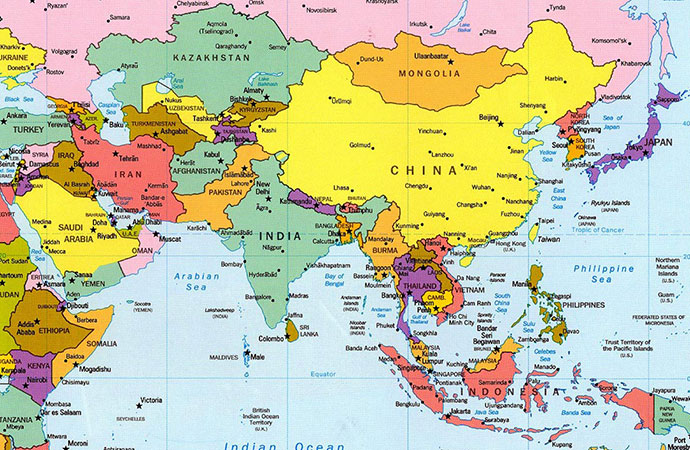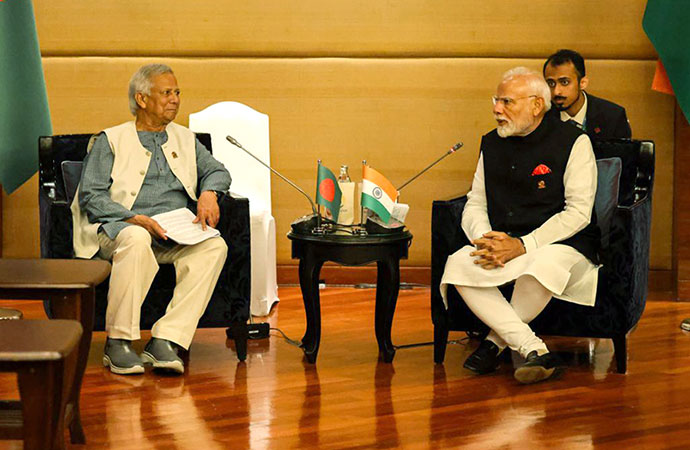Column

Image: gifex.com
Chief Adviser Muhammad Yunus has described Bangladesh as the guardian of the ocean for the landlocked region of the eastern subcontinent. This landlocked region includes the seven sister states of Northeast India and the Himalayan nations of Nepal and Bhutan. The landlocked region is home to a market of over 50 million people. In carbon-neutral Bhutan, the Chinese electric car brand BYD is one of the most sought-after car brands in the Bhutanese market. Yunus has called for extending supply chains from China to Bangladesh to cater to this strategically-important landlocked region.
The potential for an affluent trading and investment regime in the eastern subcontinent is real. I was recently in Bhutan where I enjoyed Alpine weather and snow on the slopes of the Himalayas. What if I could travel to Bhutan for skiing to escape the hot weather down in the Bengal delta? The neighborhood once boasted of possessing the city with the highest per capita income in British India. At the time, Shillong was the summer capital of Eastern Bengal and Assam and located in a hilly area nicknamed as the 'Scotland of the East'. The Assam Bengal Railway can be revived with a luxury train for tourism; while energy pipelines can link India, Bangladesh, China and Myanmar.
The business and financial elites of Bangladesh should extend the country's economic footprint across the landlocked region by leveraging Bangladesh's robust trading links with China, Western countries and other trading partners. Bangladesh is the industrial leader of the eastern subcontinent. Much like Greece, Italy and Turkey which have expanded their economic influence in the Balkans; the eastern subcontinent stands to gain from economic links with Bangladesh. This is not to suggest any kind of balkanization of northeastern India (although, the historic Assam province has been balkanized into seven Indian states). But extending supply chains across the region will temper the geopolitical balance of power with elements of economic soft power and contribute to regional stability and prosperity.
For this to happen, India has to open up the region to investments and trade. India has underinvested in its northeast. India has also suppressed the freedoms of the region's people through the draconian Armed Forces Special Powers Act (AFSPA). India's mistrust towards neighbors is driven by the unique geography of the region, with Northeast India connected to the Indian mainland by the narrow Chicken's Neck corridor. The northeast is surrounded on three sides by China, Bangladesh and Myanmar. The Indian state of Tripura is surrounded on three sides by Bangladesh.
China is the world's second largest economy and a leader in the fourth industrial revolution. India's newfound belligerence towards China betrays Delhi's historic commitment to Asian collaboration. Bangladesh's strategic partnership with China remains ironclad. The Chief Adviser's visit to Beijing is set to usher in a new era of Sino-Bangladesh strategic cooperation, including enhanced military ties. 2025 will mark the 50th anniversary of the establishment of Sino-Bangladesh diplomatic relations. China has pledged over 2 billion dollars in aid and investments during the Chief Adviser's visit, while Chinese companies are showing growing interest to invest in projects across Bangladesh. China is also the partner of choice for the Teesta River Comprehensive Management and Restoration Project.
Bangladesh will preside over the chairmanship of BIMSTEC for the next two years. Dhaka will also host a high-level conference on the Rohingya and Myanmar crises to shore up support for its refugee policy and secure commitments for more aid. The devastating earthquake in Myanmar will shed light on the need for more aid for the civil war-stricken neighbor in Southeast Asia. The conference was initially expected to consider the feasibility of a safe zone for the Rohingya in Rakhine State. The chequered history of UN-administered safe zones, including the glaring failure of the UN in Srebrenica, has raised questions about the feasibility of the safe zone proposal. This is compounded by reports of human rights abuses by rebel groups, including the Arakan Army and Rohingya militants.
At the BIMSTEC Summit, the Chief Adviser called for a humanitarian corridor in Rakhine State. He remarked that "Given the recent developments in Rakhine State, amidst the warning of UNDP of an impending famine in Rakhine, a humanitarian channel in Rakhine may be established for the supply of basic necessities to the people to stop further displacement from Rakhine". Bangladesh will host a high-level conference on the situation of Rohingya Muslims and other minorities in Myanmar in September.
A humanitarian corridor can be established to supply aid to both the Rohingya and Myanmar's wider population who are reeling from the civil war. Prior to the ceasefire declared in the wake of the recent earthquake, reports were circulating of an imminent Arakan Army offensive to take Sittwe. The Bangladesh Army may be in a position to provide vital supplies to the Arakan Army if a humanitarian corridor was established. Dhaka is also cracking down on Rohingya militants, with several top ARSA leaders being arrested. A report from Fortify Rights has pointed to kidnappings and torture by Rohingya militants across the refugee camps in Bangladesh. Militants from ARSA and RSO have established their own spheres of influence in several camps. ARSA and RSO also compete for influence in some camps. The report also indicates that some Rohingya militants have become allied with the Myanmar junta. China is reportedly favorably disposed towards the Arakan Army.
From the Arctic to the Bay of Bengal, geopolitical headwinds are changing course. Russo-American cooperation in the Arctic is now being actively considered as Donald Trump insists on expanding America's role in Greenland, which the US recognized as Danish territory in a declaration in 1916. Greenland has long been the exception to the Monroe Doctrine. America has often proposed to buy Greenland from Denmark just as Alaska was bought from Russia in 1867, which the Danes refused.
The apparent détente in Russo-American ties would have been unthinkable until a few months ago. The change of guard in Washington has ushered in the prospect of Russian and American collaboration around the melting ice of the Arctic where new shipping routes can emerge to bypass the Suez and Panama Canals. The changing of the guard in Dhaka is leading to hopes of a more robust strategic partnership with China. Beijing and Dhaka are now openly discussing the prospect of extending their economic partnership beyond borders to encompass Bangladesh's immediate neighborhood.
Umran Chowdhury is a Research Associate at the Cosmos Foundation and Bay of Bengal Institute.

























Leave a Comment
Recent Posts
Pedaling Through the Mangroves ...
The journey from the bustling streets of Barishal to the serene, emera ...
Why the Interim Government mus ...
Two weeks out from what is expected to be a red letter day in the figh ...
Doesn’t matter who thinks what about Bangladesh deci ..
The Other Lenin
US President Donald Trump said his administration
Govt moves to merge BIDA, BEZA, BEPZA, MIDA